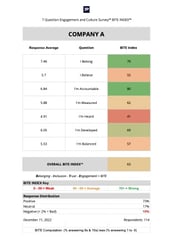Bruce Marable invited Walt Brown to be the first guest of the new decade on The Employee Cycle Podcast in an episode titled “The Best Way to Empower Employees.”
The show opens with Walt talking about how he transitioned into a career dedicated to coaching and facilitation at the behest of others, and how he has continued along that path for the last 13 years. He also delves into his book The Patient Organization, and how he wrote it in order to summarize his learnings from those first 11 years of his coaching career.
The discussion shifts to the 7 Question - 7 Promise Framework, and how Walt developed it while actively installing the Entrepreneurial Operating System, which Walt has been helping clients to install since 2007. Walt explains how he has taken 170 clients through the installation of EOS, and how he began hearing about millennials around client 85. Unlike some of his clients, Walt says he didn’t see the issues with millennials or subscribe to the stereotypes, so he asked his clients for permission to engage with the millennials within their companies.
According to Walt, his focus groups with millennials came back with how his successful clients were able to get on the same page with what “yes” looked like to seven fundamental questions, and how those same clients were able to build one fully functioning organization. The questions these clients were able to get employees to answer “yes” to had to do with belonging to and believing in the organization, along with understanding and embracing how they are accountable, measured heard and developed, and also how they are able to maintain balance. From there, employees have to buy into the priorities, strategies, and mission of the organization, and to understand what everyone in the organization is accountable for.
Bruce then asked Walt to define an “empowered employee.” Walt says he thinks about accountability alongside empowerment as things people do for themselves as opposed to things that are done to them, and that employees can empower themselves after certain obstacles have been removed from their path. Once employees understand how they fit in, Walt believes they can empower themselves.
Walt then references the SCARF Model, which has to do with the way individuals fit into tribes. He says humans are sensitive to how they fit into a place, and there are five factors that contribute to whether or not a person will feel that they fit in:
- Status - The clarity of how they fit in;
- Certainty - Being able to know where the tribe is progressing and what progress will mean for them;
- Autonomy - Humans hate to be micromanaged and want to be permitted to do their work;
- Relatedness - Do you even belong to the tribe?;
- Fairness - Are you being treated fairly, and do you believe other people are being treated fairly?
Walt says he designed the 7Q7P Framework to make sure people can answer “yes” to every element of the SCARF Model.
Moving deeper into the topic of employee engagement, Walt states that if someone doesn’t feel like they’re being honored within a group, they have difficulty feeling engaged. He says a survey is a useful tool for uncovering a lack of employee engagement, and points to the 7Q7P survey as a useful tool for asking people if they feel like they belong, on a scale of 1 to 10. However, Walt points out that people hate to be measured and then have the results returned to them if there is no plan for improvement. A plan must be put in place to address the problems unlocked by the measurement.
To listen to Walt’s full interview, please click here.





